Over the last year or so, Florida governor Ron DeSantis and the state legislature have been particularly fixated on turning the state’s public schools into a front in the culture war, with DeSantis saying that he is fighting the “woke indoctrination” of children. Teachers in Florida fear consequences for teaching gender identity and sexual orientation under the “Don’t Say Gay” law, a huge host of books with LGBTQ+ and antiracist themes have been banned from school libraries, AP African American studies has been banned, AP Psychology was briefly on the chopping block, and the conservative PragerU curriculum has been approved for use in Florida schools.
State and local government agencies in Florida want to charge me thousands of dollars to learn anything about how any of these changes are being implemented, and how teachers, students, and families feel about them.
All of the steps that DeSantis and the legislature have taken need to be implemented somehow. This means the state Department of Education, county school boards, school district administrators, individual schools, and individual teachers, principals, and superintendents have all had to learn how to navigate these changes. To that end, I have been trying to learn more about the individual machinations of how the bevy of policy changes are being enacted, and how teachers, parents, schools, and students are reacting to them. I have filed dozens of requests under the Florida Public Records Law (also called a Sunshine Law), which is supposedly one of the most expansive and forgiving in the United States.
But getting documents from Florida’s government offices that the public has a legal right to obtain—which affect not just Florida residents but people around the country as DeSantis continues his run for president—is a logistical and financial nightmare. The Florida Department of Education wants $2,416 to turn over documents about a substitute teacher being fired for posting a video of empty school library bookshelves. Others have taken my money and haven’t replied for months, let alone furnished the documents I paid for, and that they have a duty to turn over.
I have filed requests with various school districts and departments in Florida about “Don’t Say Gay,” about a substitute teacher being fired for filming empty bookcases in a school library, about AP African American Studies and AP Psychology, and about PragerU. While I have gotten some interesting documents back, Florida local governments mostly want to charge me a ton of money to provide anything.
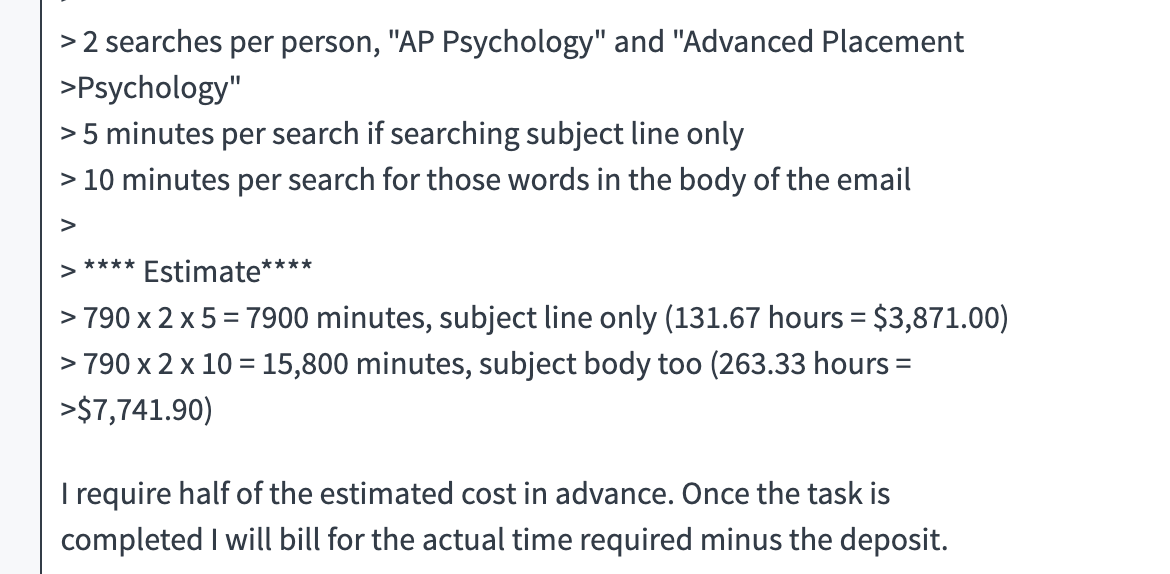
The types of responses and fees that government entities in Florida want to charge have varied wildly. Some districts have sent me documents for free within days of me requesting them. Others have claimed they don’t know how to do basic email searches, have said they need dozens of hours of redaction time for straightforward requests, and have generally made it ludicrously expensive to obtain records that have a clear public interest.
For example, I learned about an emergency meeting among superintendents after the College Board announced that Florida had effectively banned AP Psychology in the state (it later reversed the decision) and filed requests with 10 school districts for information. School district responses thus far show the wide range of potential outcomes when seeking public records that are relevant to the public. Some districts provided substantive records within a few days. Others wanted huge sums of money to even look for documents:
- Hernando County wants $329.91 to redact and produce “850 emails and 290 attachments”
- Miami-Dade County wants $105.55 to search emails
- Suwanee County wants $7,741.90 to search emails, and estimates that it will take “15,800 minutes” to search the emails of 790 employees for the term "AP Psychology" at a cost of $29.40 per hour. For what it's worth, it's common practice to have employees search their own emails, which takes two seconds, and to have them forward responsive documents to a FOIA officer, a process I have seen play out dozens of times across dozens of other requests.
- Sarasota County produced one single document, then, when I suggested that there must be others, said it wants $360.20 for “16.5 hours of redaction time.”
- St. Lucie schools wants $212.94
- The Florida Department of Education has not provided a cost estimate but told me a “proliferation of data … puts a strain on the Department’s staff and information technology resources when responding to requests for public records,” and said that it must charge me “to defray the costs to taxpayers of these requests.” It still has not provided a specific amount of money it is seeking to produce basic records that are relevant to Florida families.
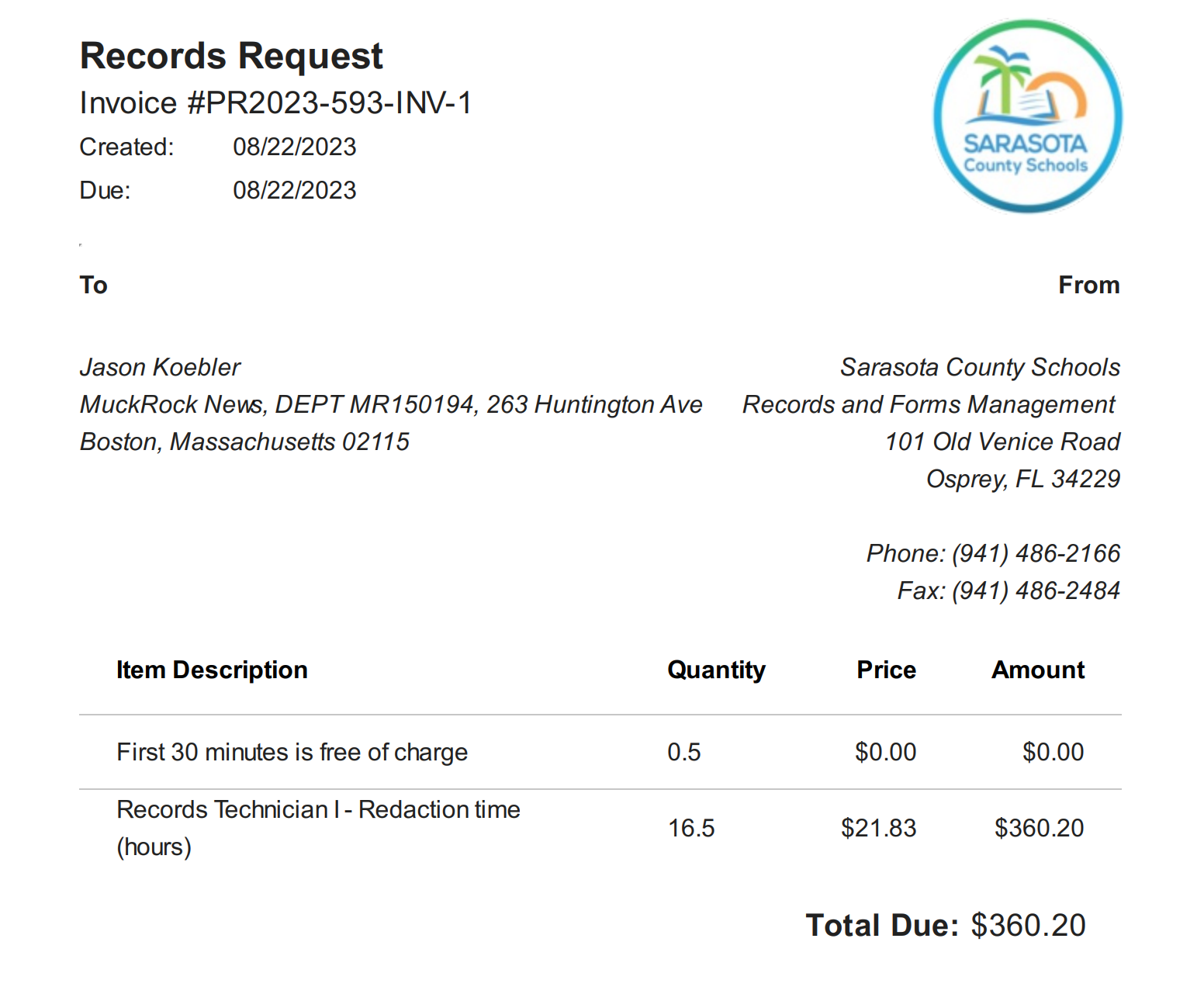
The Florida Department of Education and DeSantis’s office have been even worse. The Florida Department of Education has completely ignored some of my requests. For other requests, it has said it will charge me a fee, but hasn’t said how much the fee will actually be, and has simply attached documents that explain the statutory basis for why it is allowed to charge fees that it hasn’t actually enumerated.
In another case, where I sought records regarding the firing of substitute teacher Brian Covey after he published a video of empty library bookshelves, the DOE gave me two options: Pay $2,416.83 to review and redact the emails that were responsive to my request, or pay $34 for a one-hour de-duplication process that would reduce the overall number of responsive documents (and thus make the final fee less expensive). I paid that $34 fee in July; the agency has ignored four follow-up emails since.
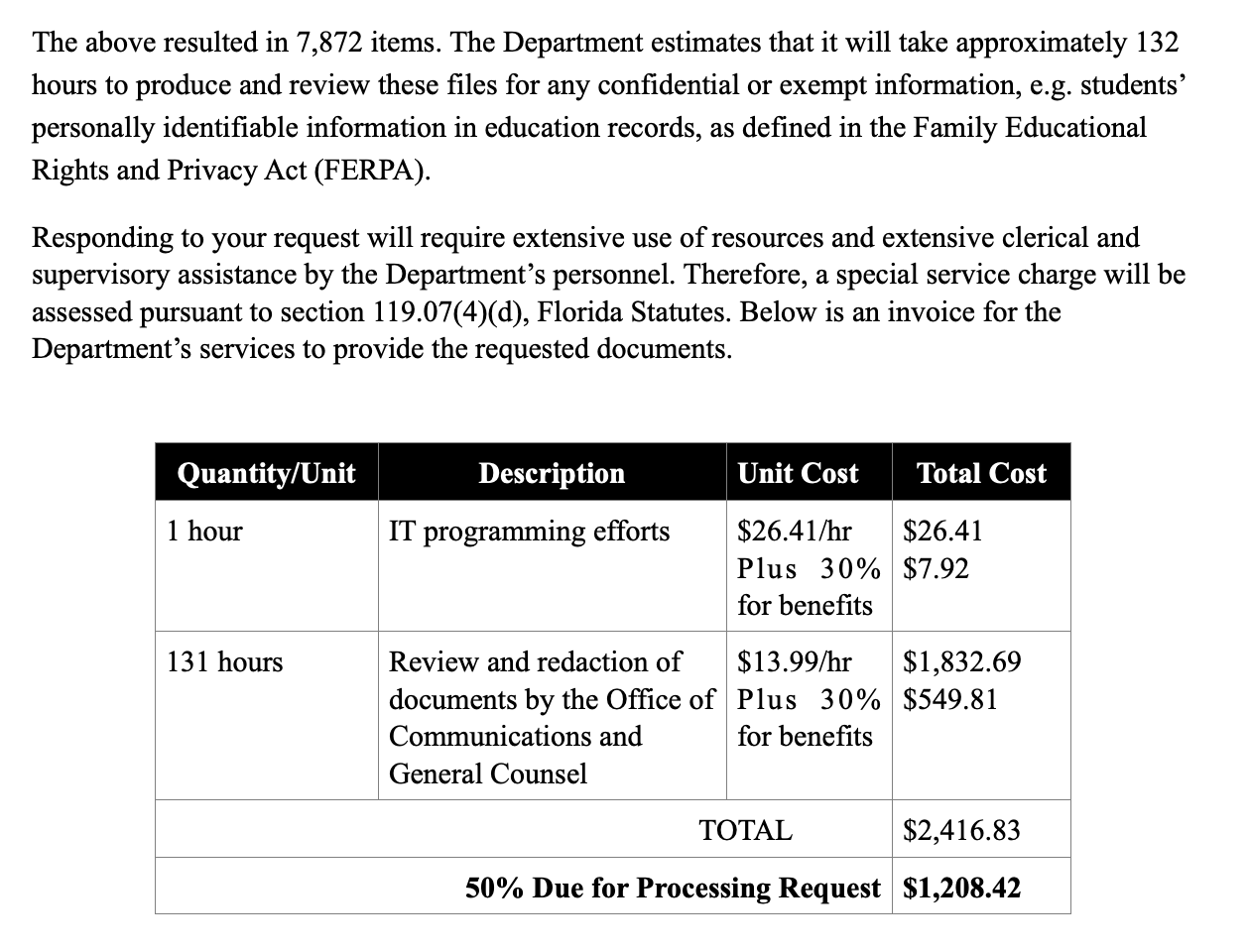
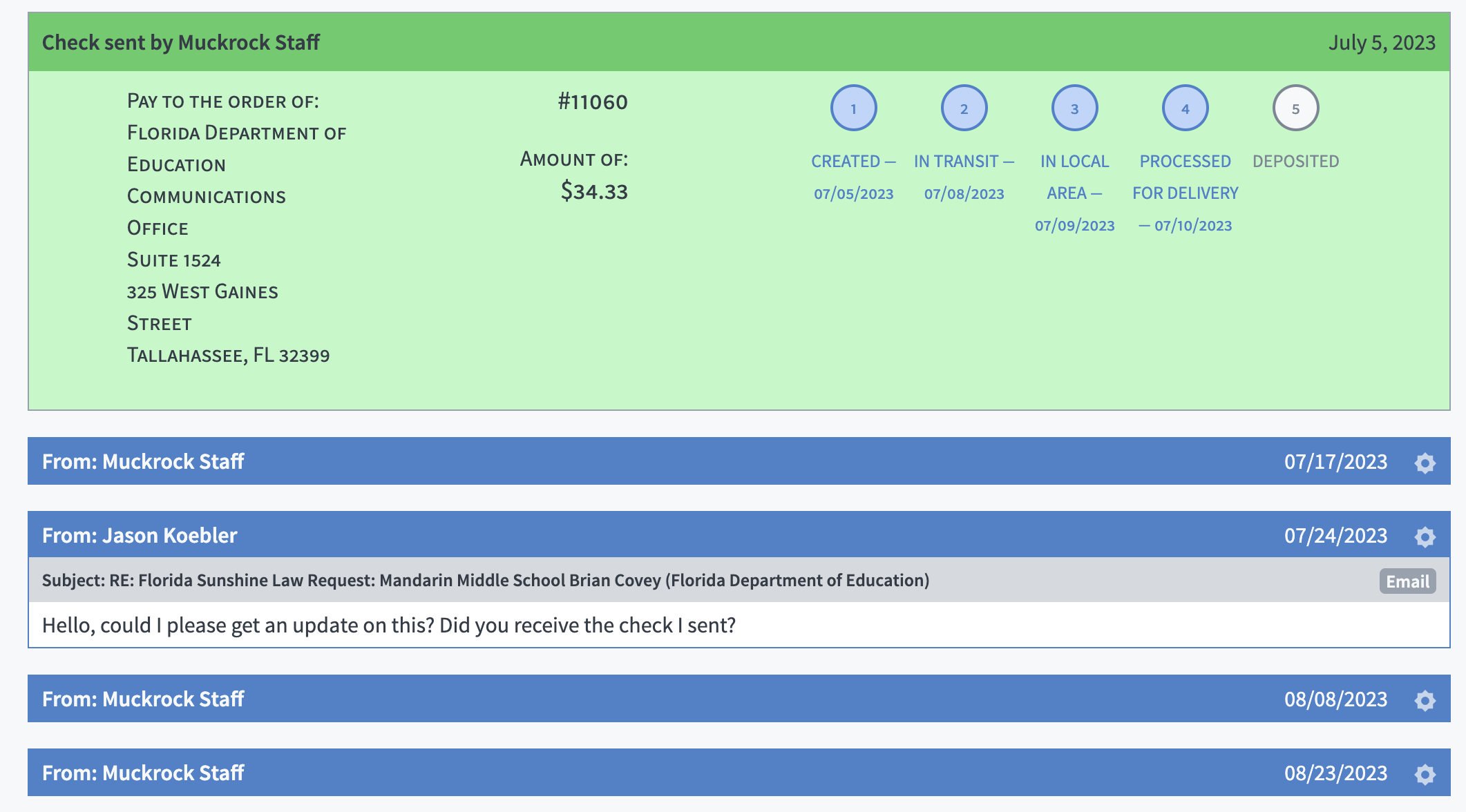
I also requested documents about Covey’s firing from the Florida Board of Governors, which found 1,500 documents related to my request. I was asked to narrow the request, and did so; I then asked for a cost estimate for the narrowed request and have simply been told that the “office is currently inundated with requests.” DeSantis’s office, meanwhile, charged me $240 for documents about Covey’s firing. I paid a 50 percent deposit of $120.85 in May. I still have not received any of the documents, and his office has simply said that it’s too busy to currently fulfill my request.
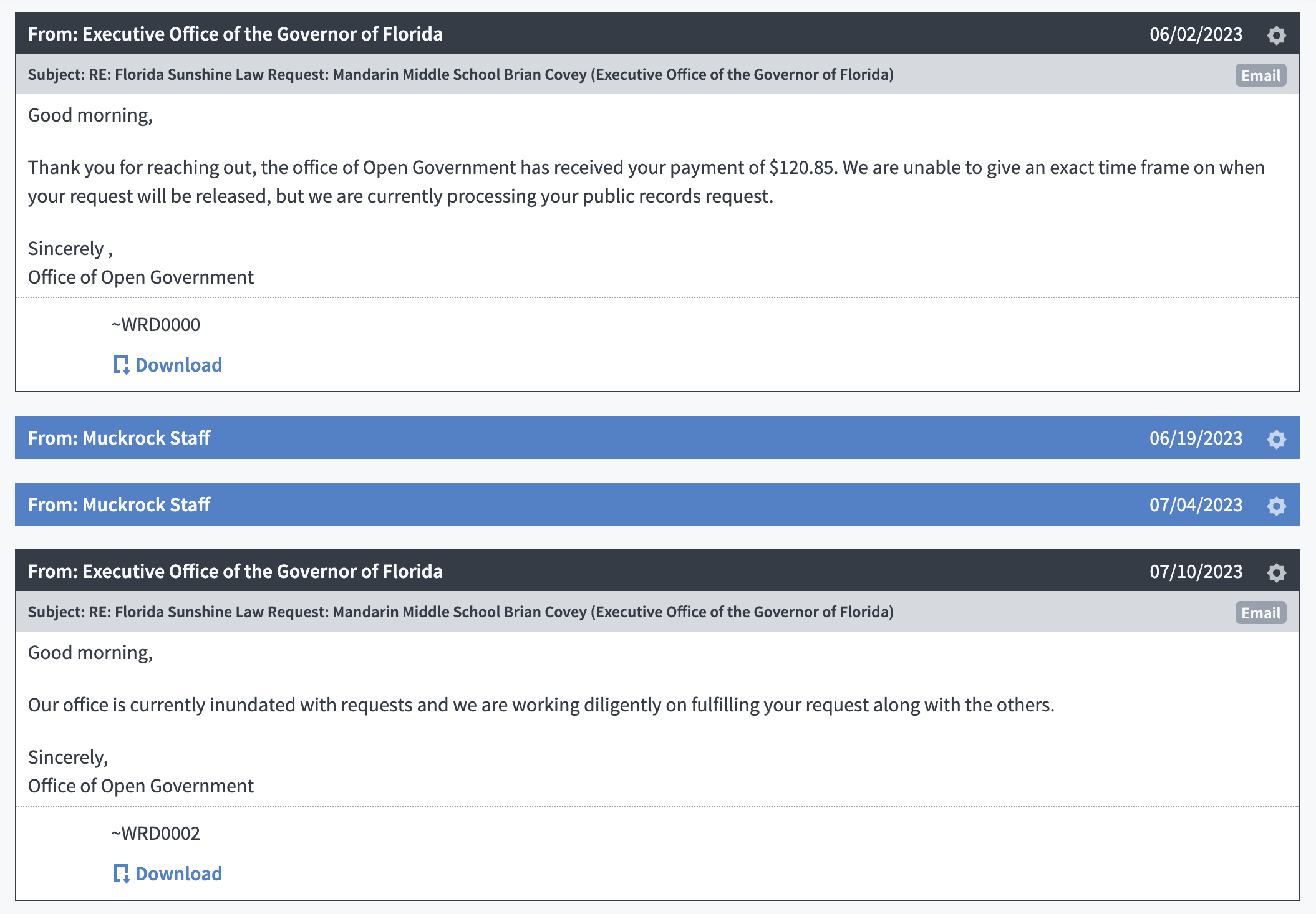
Long wait times and large fees aren’t anything new to people who have filed a lot of FOIA requests, so I’m not shocked by what’s happening. But Florida has long prided itself on having one of the nation’s best and most efficient public records laws, a status that it probably no longer deserves. An email signature in some of the documents I’ve received states “Florida has a very broad Public Records Law. Virtually all written communications to or from School District Personnel are public records available to the public and media upon request. E-mail sent or received on the School District system will be considered public and will only be withheld from disclosure if deemed confidential pursuant to State Law.” The state Attorney General’s website notes that “There is a constitutionally guaranteed right of access” to these documents.
In practice, however, astronomical fees are the loophole that prevents Florida from actually delivering on this Constitutionally-guaranteed access. Florida is one of only 19 states that don’t offer fee waivers for records in the public interest.
This is not just me whining after I’ve sent a series of vexatious and difficult requests. Most of the requests I’ve sent have been extremely straightforward, have been time-limited, and have dealt with a timely, newsworthy issue. Florida’s high fees and lack of fee waivers are a well-studied impediment to holding the government there to account.
“Excessive fees limit the media’s ability to report on government agencies and matters that affect the wellbeing of the community—from school safety to infrastructure,” Virginia Hamrick of the Florida First Amendment Foundation wrote in a study about Florida’s high public records fees in 2021 (warning - this link downloads a .docx file). “Charges prevent many members of the public from obtaining government information. As a result, public oversight of agencies is significantly impaired, and the public is less informed about the government.”
Journalist and public-interest requests make up a very small percentage of the overall number of public records requests in Florida, according to a study published in 2020 in the NY Law Journal. Just 13 percent of the public records requests they studied were from public interest groups and reporters; the vast majority were from businesses, commercial entities, and law firms looking to gain information they could then leverage for their businesses.
“Time spent debating over fees could be spent collecting and providing the records to the requester, who could then make the information known to the public at large,” Hamrick added.
This means, like so many other parts of American life, those who can afford it can get whatever they want: “For-profit businesses and requesters with the resources to pay for the records can immediately access the information,” Hamrick wrote. In the meantime, we have very little idea how DeSantis’s culture war is actually playing out behind the scenes.


